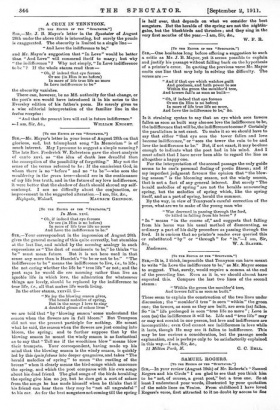[To THE EDITOR OP TEE "SPECTATOR "] In 21em. xxvi.
" Oh, if indeed that oyo foresee Or see (in Him is no before)
In more of life true life no more
And Love the indifference to be."
SIR,—Your correspondent in the impression of August 26th gives the general meaning of this quite correctly, but stumbles
at the last line, and misled by the seeming analogy in such expressions as " The dust of continents to be," he thinks "to be" must mean future. But it is not here used in that
sense any more than is Hamlet's "to be or not to be." "The indifference to be" means the indifference to live, i.e., to life ; the not caring whether the life be " true life" or not; and the poet says he would die ere morning rather than live an ignoble life in which love, the admiration for whatsoever things are lovely, should be replaced by the indifference to true life, i.e., all that makes life worth living.
In the other stanza, xxxviii. 2- " No joy the blowing season gives, The herald melodies of spring, But in the songs I love to sing A doubtful gleam of solace lives "
we are told that " by ' blowing season' some understand the season when the flowers are in full bloom." But Tennyson did not use the present participle for nothing. He meant -what he said, the season when the flowers are just coming into bloom, the spring; and to further suppose that by the
blowing season he meant the windy season is as fantastical as to say that " Tell me if the woodbines blow " means blow their trumpets. Your correspondent, having made up his
mind that the blowing season is the windy season, is quickly led by this ignis fain= into deeper quagmires, and takes " The herald melodies of spring" to mean "the rustling of the breeze" when it clearly means the bird-songs which announce the spring, and which the poet compares with his own songs about his dead friend. The glad songs of the birds heralding the spring give him no joy, but he does get a sort of solace from the songs he has made himself when he thinks that if his friend can hear them they may be "not all ungrateful"
to his ear. As for the best songsters not coming till the spring
is half over, that depends on what we consider the best songsters. But the heralds of the spring are not the nightin- gales, but the blackbirds and thrushes ; and they sing in the very first months of the year.—I am, Sir, &c., W. F. R.






































 Previous page
Previous page